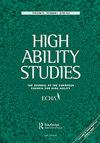More confusion about deliberate practice: commentary on Miller et al. (2018)
IF 1.8
4区 教育学
Q2 EDUCATION, SPECIAL
引用次数: 3
Abstract
Twenty-five years ago, Ericsson, Krampe, and Tesch-Römer (1993) introduced the concept of deliberate practice (DP), arguing “individual differences in ultimate performance can largely be accounted for by differential amounts of past and current levels of practice” (p. 392). In a meta-analysis (Macnamara, Hambrick, & Oswald, 2014), we found DP did not explain even most of the individual differences in performance. We concluded DP is important, just not as important as Ericsson et al. argued. In a High Ability Studies article, Miller and colleagues (Miller et al., 2018) claim that “although all 88 studies in Macnamara et al. (2014) were ‘interpreted’ by the researchers as DP, in reality, they were not” (p. 5). Miller et al. reanalyzed our dataset and report performance correlated more strongly with DP (.40; our correlation was .38) than with activities they deemed nonDP (.21). We credit Miller et al. (2018) for their efforts. However, it is unclear what the criteria for DP were in their reanalysis. Furthermore, Miller et al. miss the mark on a critical methodological point. We discuss these problems in turn.对蓄意行为的更多困惑:Miller等人的评论(2018)
25年前,Ericsson、Krampe和Tesch-Römer(1993)引入了刻意练习(DP)的概念,认为“最终表现的个体差异在很大程度上可以通过过去和现在练习水平的差异来解释”(第392页)。在一项元分析中(Macnamara, Hambrick, & Oswald, 2014),我们发现DP甚至不能解释大多数的个人表现差异。我们得出结论,DP很重要,只是没有Ericsson等人认为的那么重要。在《高能力研究》(High Ability Studies)的一篇文章中,Miller及其同事(Miller et al., 2018)声称“尽管Macnamara et al.(2014)的所有88项研究都被研究人员‘解释’为DP,但实际上并非如此”(第5页)。Miller等人重新分析了我们的数据集,并报告绩效与DP的相关性更强(0.40;我们的相关性为0.38),而非他们认为的非dp活动(0.21)。我们将米勒等人(2018)的努力归功于他们。然而,在他们的重新分析中,DP的标准是什么尚不清楚。此外,Miller等人在一个关键的方法论观点上没有抓住要点。我们依次讨论这些问题。
本文章由计算机程序翻译,如有差异,请以英文原文为准。
求助全文
约1分钟内获得全文
求助全文
来源期刊

High Ability Studies
Multiple-
CiteScore
4.80
自引率
11.10%
发文量
7
期刊介绍:
High Ability Studies provides a forum for scholars in a variety of disciplines associated with the development of human abilities to their highest level. It is a medium for the promotion of high ability, whether through the communication of scientific research, theory, or the exchange of practical experience and ideas. The contents of this journal are unique in reflecting concerns and recent developments in this area from childhood and across the whole life span in a variety of contexts. Far from being restricted to the traditional focus on high-level cognitive development, it also presents investigations into all other areas of human endeavour, including sport, technology, the arts, business, management and social relations.
 求助内容:
求助内容: 应助结果提醒方式:
应助结果提醒方式:


